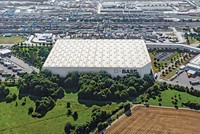Advertisement
Grab your lab coat. Let's get started
Welcome!
Welcome!
Create an account below to get 6 C&EN articles per month, receive newsletters and more - all free.
It seems this is your first time logging in online. Please enter the following information to continue.
As an ACS member you automatically get access to this site. All we need is few more details to create your reading experience.
Not you? Sign in with a different account.
Not you? Sign in with a different account.
ERROR 1
ERROR 1
ERROR 2
ERROR 2
ERROR 2
ERROR 2
ERROR 2
Password and Confirm password must match.
If you have an ACS member number, please enter it here so we can link this account to your membership. (optional)
ERROR 2
ACS values your privacy. By submitting your information, you are gaining access to C&EN and subscribing to our weekly newsletter. We use the information you provide to make your reading experience better, and we will never sell your data to third party members.
Business
United States: Chemical industry prepares for a slow recovery in 2010
by Melody Voith
January 11, 2010
| A version of this story appeared in
Volume 88, Issue 2
The deepest recession since the Great Depression is in the rearview mirror, and economists have turned their attention to the shape of the recovery. In the U.S. and other developed economies, the modest growth projected for 2010 will not make up for the precipitous drop in demand that began in late 2008.
COVER STORY
United States: Chemical industry prepares for a slow recovery in 2010
For the U.S. chemical industry, output excluding pharmaceuticals declined by 9.4% in 2009, according to T. Kevin Swift, senior economist at the American Chemistry Council (ACC), a chemical industry trade association. In 2008, output fell 6.5%. Basic chemicals were especially hard hit in 2009, contracting 21.5%.
After bottoming out in June of last year, the chemical industry’s fortunes began to turn in the third quarter as demand stabilized. Swift projects U.S. chemical output will grow 3.0% in 2010 and that pharmaceuticals will see a 4.1% boost.
The beginnings of the recovery will be seen in rising inventories, now that the rapid destocking that followed the financial collapse has ended. “The construction and auto markets have run out of inventory and are upping production,” Swift observes. However, underlying demand is questionable.
A normal economic recovery is V-shaped due to pent-up demand, but this one is expected to be more shallow, agrees Tim Hanley, chemical group leader at business consultancy Deloitte. “We should expect a reset environment rather than a rebound environment,” Hanley warns. “Some consumer product end markets are strong—for example, soaps and detergents and personal care. But auto, housing, and construction markets will stay weak.”
Swift says low natural gas prices and the weak dollar will make the U.S. more competitive than other developed economies. But many U.S. chemical plants that were idled during the recession will not come back on-line.
During the recession, the chemical industry conserved cash by cutting capital spending by 20.1%, according to ACC. Even if growth comes back, companies have significant excess capacity. In 2009, capacity utilization was extremely low, at 70.1%, and will grow only to 72.9% in 2010. Swift says firms won’t begin investing again until 2011.
But any increase in spending will not reverse the loss in chemical employment. The industry lost more than 37,000 jobs, or 4.4% of its workforce, in 2009. Swift anticipates productivity gains will cause more job losses in 2010.




Join the conversation
Contact the reporter
Submit a Letter to the Editor for publication
Engage with us on Twitter